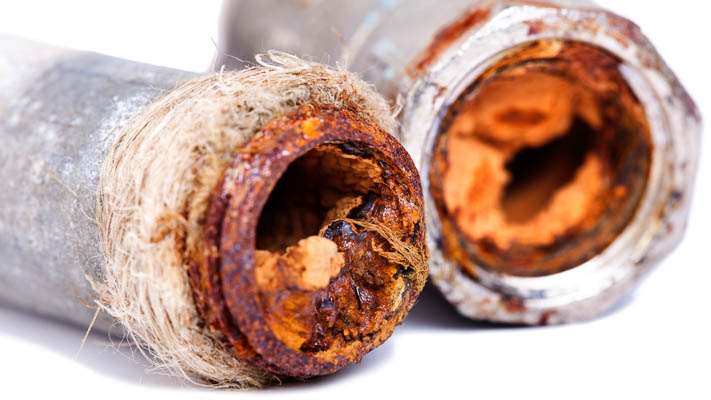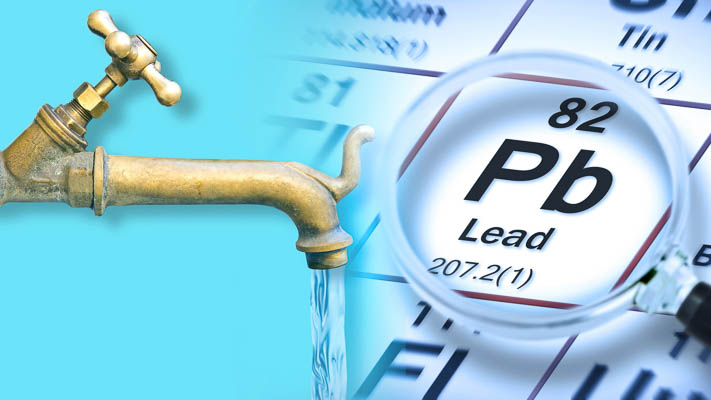What Are Lead Pipes and Why Were They Used?
Lead pipes, made from the heavy metal lead, were once commonly used in plumbing systems and service lines that supplied homes with water.
In the past, lead's flexibility made it ideal for creating pipes that could fit into complex or uneven spaces, which was particularly useful in older buildings.
Lead's resistance to corrosion also added to its popularity in plumbing. However, the very malleability that made lead pipes easy to shape eventually became a major disadvantage, as we now understand the health risks associated with lead.
Why Are Lead Pipes Dangerous?
Over time, water can cause lead to leach from pipes into the water supply, leading to serious health risks, including damage to the brain and nervous system.
Long-term exposure to lead in drinking water is particularly harmful to children and pregnant women, and the dangers associated with lead poisoning eventually prompted a shift away from using it in plumbing.
One of the most recent major lead health concerns was the Michigan Flint water crisis in 2014. After changing Flint's water supply to the local Flint River, there was a sudden increase in lead levels in the water supply. More than 100,000 residents were exposed to dangerously high levels of lead, resulting in severe long-term health consequences.
Since the 1986 Safe Drinking Water Act Lead Ban, lead pipes have been largely banned from new residential plumbing systems. This law prohibits the use of lead in any pipes or solder used for supplying drinking water.
Where Are Lead Pipes Still Used?
Despite efforts to eliminate lead from most piping systems, lead pipes can still be found in water service lines or properties that haven't been repiped since the 1986 ban.
Lead service lines connect a property to the public water main and play a key role in plumbing infrastructure. These lines carry water from the municipal water source to individual homes or buildings, which can result in lead leaching into drinking water as it enters the home.
Lead pipes are also present in some municipal distribution systems, which transport treated water from the treatment plant to different areas within a city or community.
According to an article by the New York Times, over 9 million lead service lines still exist across the United States, often found in older, industrial areas. Identifying and replacing these lead service lines has become a priority in water safety initiatives in the United States. The Biden Administration has just announced that all lead pipe must be replaced within the next ten years.
The new program that has been issued by the Environmental Protection Agency (E.P.A.) focuses on replacing lead service lines that bring water into homes, rather than internal freshwater lines. While most homes no longer have lead pipes, the plan does not cover the replacement of any lead pipes still present inside a home's plumbing system.
Get your free estimate today
With over 75,000 repipes completed, we've perfected our One-Stop Repipe™ for your home.
Can Water Filtration Systems Eliminate Lead Contamination?
Water filtration systems can help reduce lead in drinking water and improve the quality of water in your home.
Filters like activated carbon or reverse osmosis can lower lead levels by trapping lead particles. However, their effectiveness can vary, and regular upkeep is needed to keep them working well.
Point-of-use filters are especially useful for removing lead at specific points, like kitchen taps. Make sure to choose filters certified for lead reduction. Some systems may also include a water softener.
While a filtration system can be valuable, it should not be considered a sole solution. Water filtration systems will eliminate lead contamination from service lines outside of your home's internal plumbing; however, they may not filter lead that is still present in the internal water lines.
The most reliable approach to stop lead contamination is to combine water filtration with measures such as checking your internal water lines for a more complete and long-lasting solution to ensure safe drinking water.
Does My Home Still Have Lead Pipes?
You can check for lead pipes in your home by using a simple scratch test, among other methods.
Lead pipes usually have a dull gray color. To perform a scratch test, gently scrape the service line pipe entering your water meter with a key or coin. If it's lead, the scratch will reveal a shiny silver mark. (Be sure to handle this test carefully.)
There are also home lead test kits available to help you identify if your water pipes contain lead. Some examples include:
- Lead Test Strips: These strips, such as a WaterSafe Lead Water Test Kit, are designed to detect lead levels in water. You immerse the strip in your water sample, and it changes color based on the lead concentration.
- Home Water Lead Test Kits: Water test kits, like the Allora Water Test Kit, often include multiple tests for various contaminants, including lead. They usually come with detailed instructions on how to collect and test your water.
Although lead pipes are now rare in homes, galvanized steel pipes are still common and can be mistaken for lead.
You can also use a scratch test to check galvanized pipes. While they look similar to lead, galvanized pipes are magnetic, and lead pipes are not. Lead pipes also don't rust, while galvanized pipes can cause rust to show up in your drinking water. Lead pipes were regularly phased out and replaced by galvanized piping from as early as the 1920's.

It is important to know that galvanized plumbing has also been replaced by modern materials. If you have either lead or galvanized pipes, it's not a question of if, but when you should replace them.
What is the Best Lead Or Galvanized Replacement Options?
Life depends on water—clean water! When considering repiping options to ensure safe drinking water in your home, especially if you have lead or galvanized steel pipes, we offer two effective choices, each with its own benefits.
- Copper: Copper piping has been a trusted and popular choice for repiping projects for decades, offering numerous advantages for whole home repipes. Copper is a durable material that ensures a long-lasting solution that minimizes the risk of lead leaching into the water supply.
- PEX: PEX (cross-linked polyethylene) tubing has quickly become one of the safest and best options to ensure that your home's fresh water is clean and long-lasting. PEX is flexible, cost-effective, and resistant to corrosion. You can read more about the benefits of PEX tubing in our in-depth article.
Both copper and PEX pipes meet modern plumbing standards and regulations, giving homeowners confidence in their water quality.
The importance of a clean water supply in your home cannot be overstated, as it directly affects the health and well-being of everyone living there. Choosing the right repiping option is crucial for ensuring a reliable, safe, and contaminant-free water supply, which contributes to the overall health and quality of life for residents.
For more information, please feel free to contact us to schedule a free consultation with one of our local repipe consultants.
Get your free estimate today
With over 75,000 repipes completed, we've perfected our One-Stop Repipe™ for your home.
Get a Quote for Your Home Repipe
Here at Repipe Specialists, we've fully replaced the plumbing in over 75,000 homes since 1991 using both copper piping and PEX tubing. We continually get positive customer feedback from customers about their overall home repipe experiences. We often exceed their expectations on:
- Speed: Our repipe crews typically complete a repipe in a day, returning on another day for wall patching.
- Convenience: Through our One-Stop Repipe™ Process, we handle everything from permits, to wall patching, to inspections.
- Cleanliness: Our crews are trained to protect your home while working (we cover all surfaces with protective sheeting), and to clean up fully at the end of each day.
- Peace of Mind: Repipe Specialists is a fully licensed plumber in every state we operate in, and we back all of our repipes with a lifetime warranty.
- Financing programs: To help take the sting out of unplanned repipe expenses, we offer several financing programs.
- Price: As a specialist that performs hundreds of repipes a week, we can deliver high-quality repipes at a lower cost vs generalist plumbers. We have an article that covers repipe cost factors in detail. Our quotes typically range from $4,500 to $15,000 depending on the size and complexity of your project.
Schedule a free in-home consult, and one of our local repipe consultants will explain all your repipe options and provide you with a written, fixed-price quote. Remove outdated galvanized and lead pipes for good, repipe with PEX or copper.

